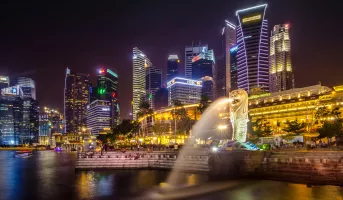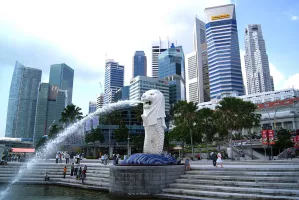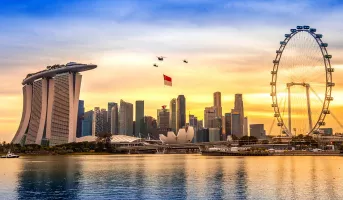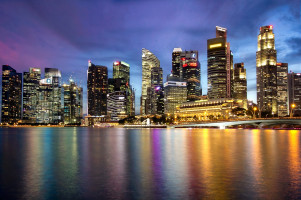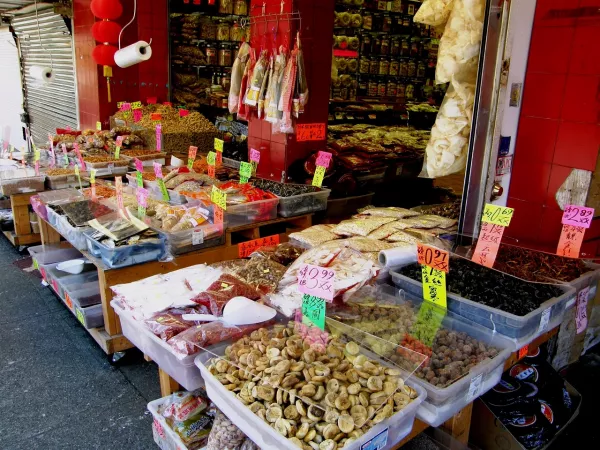
Chinatown, Singapore Travel Guide
Chinatown in Singapore is a vibrant and bustling district that is rich in history and culture. Known for its colorful Peranakan shophouses, aromatic street food, and traditional Chinese temples, Chinatown is a melting pot of traditions and modernity. The area dates back to the early days of Singapore's founding and has preserved its heritage while embracing new trends.Top Attractions in Chinatown
- Chinatown Heritage Centre
- Buddha Tooth Relic Temple
- Maxwell Food Centre
- Thian Hock Keng Temple
- Ann Siang Hill
Chinatown is Famous for
Its vibrant mix of heritage sites, delicious street food, and lively markets make Chinatown a must-visit destination in Singapore.Top Attractions in Chinatown
- Explore the bustling street markets
- Try authentic Singaporean dishes at local eateries
- Visit the historical temples and museums
- Shop for unique souvenirs and handicrafts
- Experience the vibrant nightlife in the area
What's Great about Travelling to Chinatown?
- Rich cultural experiences - Delicious food options - Vibrant atmosphere - Great shopping opportunitiesWhat's Not So Great about Travelling to Chinatown?
- Crowded streets - High tourist traffic - Limited parking optionsTravel Tips for Chinatown
- Carry cash for street vendors
- Respect local customs and traditions
- Stay hydrated in the tropical climate
- Watch out for pickpockets in crowded areas
Important Chinatown trip information
- Ideal Duration: 2-3 days
- Best Time to Visit: Between February and April
- Nearby Airports and Railway Stations: Changi Airport, Outram Park MRT Station
Per Person
27,125
*EXCLUDING APPLICABLE TAXES 4.9 Ratings
( 185 Reviews )
( 185 Reviews )
Per Person
50,880
*EXCLUDING APPLICABLE TAXES 4.9 Ratings
( 185 Reviews )
( 185 Reviews )
Per Person
61,000
*EXCLUDING APPLICABLE TAXES 4.2 Ratings
( 38 Reviews )
( 38 Reviews )
Per Person
29,000
*EXCLUDING APPLICABLE TAXES 5.0 Ratings
( 4 Reviews )
( 4 Reviews )
Per Person
50,900
*EXCLUDING APPLICABLE TAXES 4.9 Ratings
( 185 Reviews )
( 185 Reviews )
Per Person
49,999
*EXCLUDING APPLICABLE TAXES 5.0 Ratings
( 17 Reviews )
( 17 Reviews )
FAQ's on Chinatown, Singapore
Q1: What is the best time to visit Chinatown, Singapore?
Chinatown, Singapore, is best visited during the dry season from February to April and from July to October to avoid heavy rainfall. The Chinese New Year celebrations in January or February are a vibrant time to experience the culture and festivities. Tourist seasons are generally busy, so consider shoulder months for fewer crowds and better deals on accommodations.
Q2: Do I need a visa to travel to Chinatown, Singapore?
Most tourists do not need a visa for short visits to Singapore, including Chinatown, for up to 90 days. Check the specific visa requirements based on your nationality. Ensure your passport has at least six months' validity beyond your intended stay.
Q3: What are the must-visit attractions in Chinatown, Singapore?
Must-visit attractions in Chinatown include the Buddha Tooth Relic Temple, Sri Mariamman Temple, Chinatown Street Market, and the Thian Hock Keng Temple. Explore the vibrant streets, try local delicacies, and visit the Chinatown Heritage Centre for a glimpse into the area's history.
Q4: Is Chinatown, Singapore a safe place to travel?
Chinatown, Singapore, is generally safe for travelers. Exercise normal precautions against petty theft and be cautious in crowded areas. Avoid dark alleys at night and be aware of your surroundings. Follow local laws and customs to ensure a safe and enjoyable visit.
Q5: What is the local currency in Chinatown, Singapore and can I use credit cards?
The local currency in Singapore is the Singapore Dollar (SGD). Credit cards are widely accepted in Chinatown, especially in shops and restaurants. ATMs are also easily accessible for cash withdrawals.
Q6: What is the local cuisine like in Chinatown, Singapore?
Chinatown offers a diverse range of culinary delights, from traditional Chinese dishes to local street food. Must-try dishes include Hainanese chicken rice, chili crab, laksa, and bak kut teh. Vegetarian and halal options are also available for those with dietary restrictions.
Q7: What transportation options are available in Chinatown, Singapore?
Transportation options in Chinatown include an efficient MRT (Mass Rapid Transit) system, buses, taxis, and ride-hailing services like Grab. Walking is also a popular way to explore the neighborhood due to its compact size and pedestrian-friendly streets.
Q8: Are there any cultural norms or etiquette I should be aware of when visiting Chinatown, Singapore?
When visiting Chinatown, Singapore, respect local customs by dressing modestly, especially when entering temples or mosques. Remove your shoes before entering homes or places of worship. Avoid pointing with your fingers and be mindful of personal space. It's polite to greet locals with a smile and a slight bow as a sign of respect.
Q9: I am a travel agent. How can I buy travel leads of Chinatown, Singapore?
Register yourself as a travel agent at agents.tripclap.com and then you can buy travel leads to Chinatown, Singapore once your account is approved. For more details contact our support team at +91-8069186564 or support@tripclap.com

